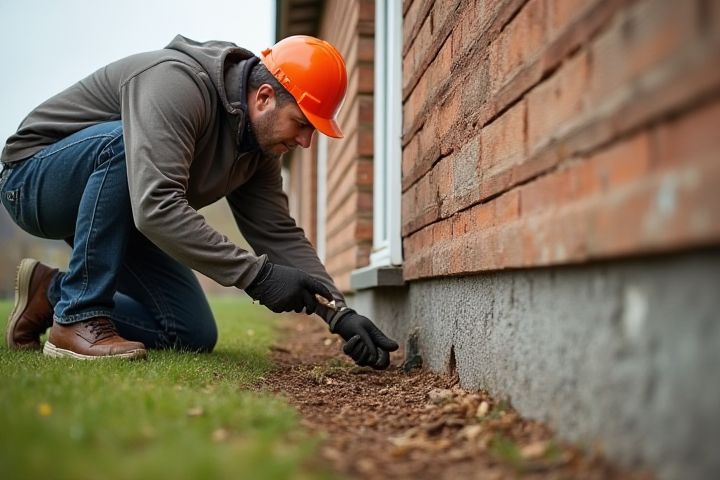
A structural engineer typically checks house foundations to assess their integrity and safety. Home inspectors also evaluate foundations during property inspections, looking for signs of damage or settlement. Foundation repair specialists focus on identifying existing issues and suggesting solutions such as underpinning or piers. If you notice cracks in walls or uneven floors, it's wise to consult a professional. Regular maintenance and timely inspections can prevent more severe structural problems in the future.
Who Checks House Foundation
Licensed structural engineers.
Licensed structural engineers are essential for evaluating house foundations, as they possess the necessary expertise and knowledge. They assess critical factors such as soil stability, load-bearing capacity, and the quality of construction materials to ensure your home is safe and structurally sound. Typically, the inspection process includes using specialized tools to measure foundation settlement or crack widths, often reporting in compliance with state codes. Hiring a licensed structural engineer can cost between $300 and $1,500, providing you with valuable insights and peace of mind regarding your home's structural integrity.
Professional home inspectors.
Professional home inspectors play a crucial role in assessing the integrity of a house foundation. They typically conduct a thorough visual inspection, looking for signs of settlement, cracks, or moisture issues that could indicate structural problems. Many inspectors also utilize specialized tools, such as laser levels and moisture meters, to gather precise data about the foundation's condition. Ensuring your foundation is evaluated by a certified inspector can help prevent costly repairs and provide peace of mind regarding your home's stability.
Licensed general contractors.
Licensed general contractors play a crucial role in inspecting house foundations, ensuring they meet local building codes and safety standards. They utilize advanced tools and techniques to identify potential issues such as cracks, settling, or moisture intrusion that could compromise structural integrity. Regular foundation evaluations, recommended every 5 to 10 years, can help prevent costly repairs and ensure the longevity of your home. By hiring a reputable contractor, you can gain peace of mind and safeguard your investment.
Civil engineers specialized in buildings.
Civil engineers specializing in buildings are essential for evaluating house foundations, ensuring structural integrity and safety. They typically assess factors such as soil composition, load-bearing capacity, and weathering impact over time. Utilizing advanced tools, these professionals conduct thorough inspections to identify cracks, settling, or moisture issues, quantifying findings with precise measurements. With a keen understanding of building codes and regulations, they provide valuable recommendations for foundation repairs or reinforcement, safeguarding your investment in the property.
Foundation repair specialists.
Foundation repair specialists assess the integrity of your home's foundation using advanced techniques such as soil analysis and structural assessments. These experts often utilize tools like laser levels and moisture meters to detect issues like settling, cracks, or water intrusion, which can indicate a compromised foundation. On average, foundation repairs can range from $2,000 to $7,000, largely depending on the severity of the damage and the methods required for restoration. Regular inspections from these specialists can help ensure the long-term stability of your house, potentially saving you from expensive repairs in the future.
Geotechnical engineers.
Geotechnical engineers specialize in evaluating the stability and integrity of house foundations, utilizing their expertise in soil mechanics and earth sciences. They conduct thorough site investigations, including soil sampling and testing, to assess factors like soil composition, bearing capacity, and water drainage. By analyzing this data, they provide recommendations for foundation design and construction techniques, ensuring safety and durability. Proper assessments from geotechnical engineers can prevent costly future damage, enhancing the structural reliability of your home.
Building code inspectors.
Building code inspectors are responsible for evaluating the structural integrity of house foundations, ensuring compliance with local building codes and safety regulations. They assess various aspects, including the depth of footings, materials used, and potential drainage issues that might affect the foundation's stability. During inspections, these professionals may also use specialized tools to detect any existing cracks or shifts in the foundation that could compromise the home's overall stability. Understanding their role is crucial for homeowners seeking to maintain the integrity of their property and ensure a safe living environment.
Mortgage and insurance inspectors.
Mortgage and insurance inspectors play a crucial role in assessing the integrity of a house foundation. They meticulously examine signs of structural issues, such as cracks or settling, which could indicate potential risks. When applying for a mortgage, lenders often require a thorough foundation inspection to ensure the property meets their standards, potentially impacting your loan approval process. Similarly, insurance companies may mandate such inspections to mitigate risk and determine coverage options, emphasizing the importance of a stable foundation in protecting your investment.
Real estate inspectors.
Real estate inspectors play a crucial role in assessing house foundations, ensuring your property is structurally sound. They typically evaluate several key aspects, including foundation cracks, settling issues, and moisture problems, which can affect the overall integrity of your home. On average, a thorough inspection may cost between $300 and $500 and can take about two to four hours, depending on the property's size and complexity. By identifying potential issues early, inspectors help you make informed decisions, potentially saving thousands in future repair costs.
Experienced masons.
Experienced masons often check the house foundation to ensure structural integrity, identifying issues such as cracks, settling, or moisture intrusion. A thorough inspection may include measuring the foundation's depth, width, and alignment, alongside analyzing soil composition that supports the structure. Many recommend scheduling an evaluation every 5 years, especially in regions prone to extreme weather conditions or soil movement. Relying on seasoned professionals can save you significant repair costs by addressing potential problems before they escalate.
